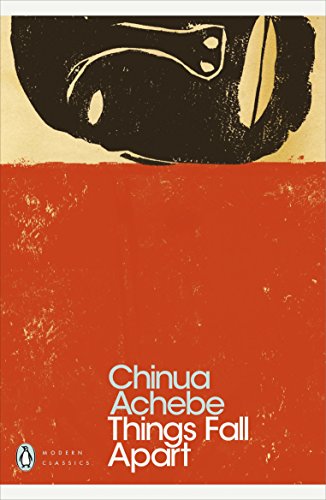Analysis questions response on Things Fall Apart

Analysis questions response on Things Fall Apart
1. The novel is structured in three parts. What do the divisions reflect about the stages of life of the protagonist? How do the divisions move towards and illustrate the collapse of the Igbo society? Achebe divided the novel in three parts; the first part followed a circumlocutory storyline where the narrator goes back and forth in time in order to help establish the context of the society and life uninfluenced by external factors. In the second and third parts, the story becomes more linear and fast-paced in order to match the various events occurring. This matches the concept of rapid industrialization that came along with the Britishers. The first part shows the society existing in order, a proper system of society that ran on their own beliefs and traditions. The second part emphasizes on change, which occurs when Okonkwo has to go to his motherland after being exiled. And this transition part leads Achebe to slowly introduce the idea of foreigners coming to these villages and starting to interact with the people. And in the third part, we are fully exposed to the white colonizers and because of part 2, we are exposed to a society that has radically changed. This enables the reader to compare the societies by looking at part 1 and part 3, and better illustrate the collapse of the Igbo society. 2. In the novel's opening, Okonkwo is wrestling. How does this contrast with the ending, when Okonkwo is deliberating about an adequate response to the British humiliation of the Igbo elders in jail? Okonkwo is introduced as a great warrior; with great strength and a high reputation for defeating the Cat in wrestling, which was a huge achievement. Initially, the reader imagines Okonkwo to be a noble and great character. However, by the end we see the inner anger and insecurities pouring out of him. He no longer can maintain that great reputation, and instead is seen as a rash, arrogant man who is filled with anger due to his hurt pride. This change in character really reflects how the character's inner conflict and the external conflict with the rapidly changing society.
3. Achebe uses storytelling flashbacks to describe the relationship of Okonkwo and Unoka. What do the flashbacks reveal about their relationship? What is the effect of the use of storytelling to illustrate the flashbacks? These storytelling flashbacks highlight important moments in the lives of the characters, that while they might not have been occurring concurrently with the timeline of the story, they still have played a big influence on the characters's personality and development. In this case, we don't get to witness the character of Unoka as he is deceased by the timeline of the story, but his character still plays a huge role on shaping Okonkwo, and justifies the flaws and insecurities Okonkwo maintains. So the use of storytelling can help the reader get a better understanding of the characters, their culture and society. 4. What is the point of view of the narrator? How does the point of view contribute to our understanding of the conflicting cultures? What techniques does the narrator use to evoke a participatory role for the reader? Achebe takes a third-person omniscient (all-knowing and objective perspective) narration. Although there isn’t a dominant point of view, the narration shifts between characters throughout. This type of perspective reveals the private thoughts, secrets or hidden events, jumping between space and time. They tend to rearrange the linear chronological events of a story in order to help paint a better image of it. And this can be useful in this novel because the target audience, the Western world, is not exposed to a lot of the Igbo culture and so, moving back and forth in time allows for painting a better characterisation and establish a better context. He tends to give a lot of history on the characters in order to portray how they’ve changed thus far, and continues to further portray change throughout the novel.
5. Why is Okonkwo exiled? Why is the exile ironic? Compare to Okonkwo's participation in the killing of Ikemefuna and its lack of consequences. Okonkwo is exiled for accidently shooting a clansman (16 year old) with his shotgun. This was considered a 'female' accident as it was unintentional, so he was exiled to his motherland Mbanto for 7 years as a repayment to the offend he has caused to the Earth goddess Ani. This is ironic because throughout most of the part 1, Okonkwo is seen as someone heavily concerned with his social standing, achievements and titles. He tried to maintain a high and strong reputation, and earn the respect of the entire village. However, this one accident led him to being kicked out of the village, which goes against all his desires and goals. He intended to build up his status even more, but ironically ended up losing all of them and his house and forced to flee.


Comments
Post a Comment